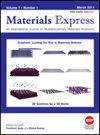Effect of quercetin on acute appendicitis by reduction of Caspase-1 and inflammatory factors release through Toll-like receptor 4/nuclear factor kappa-B pathway
IF 0.7
4区 材料科学
Q3 Materials Science
引用次数: 0
Abstract
It has been reported that, quercetin can improve body’s inflammatory response through Toll-like receptor 4/nuclear factor kappa-B (TLR4/NF-κB) signaling, thereby playing a role in treating acute appendicitis. Firstly, acute appendicitis model was established in rats, where blank group, acute appendicitis model group, and quercetin intervention group (quercetin group) were set up to detect the effect of quercetin on acute appendicitis. In addition, the model, Toll-like receptor 4 inhibitor (TAK-242), Lipopolysaccharides (LPS), quercetin+ TAK-242, and quercetin+LPS groups were set to assess whether quercetin reduces Caspase-1 (CASP-1) through TLR4/NF-KB signaling and regulates the release of inflammatory factors to exert the effect on treating acute appendicitis. (1) Quercetin significantly inhibited the biological effects of tissue inflammation in rats with appendicitis and this process was related to decreased expression of TLR4 and NF-κB; (2) Quercetin also inhibited TLR4 and NF-κB expression and after using TLR4 inhibitors, the release of inflammatory factors in rat appendix tissue was controlled, especially in the quercetin+TAK-242 group. Quercetin can significantly block the development of inflammatory response in acute appendicitis, and this process is mainly achieved by reducing inflammatory factors. In addition, quercetin can effectively inhibit TLR4/NF-κB signaling related to anti-inflammatory effect, thereby down-regulating the expression of CASP-1, and finally inhibiting the inflammatory response of acute appendicitis.槲皮素通过Toll样受体4/核因子kappa-B途径减少Caspase-1和炎症因子的释放对急性阑尾炎的影响
有报道称,槲皮素可通过toll样受体4/核因子κ b (TLR4/NF-κB)信号通路改善机体炎症反应,从而起到治疗急性阑尾炎的作用。首先,建立大鼠急性阑尾炎模型,分别建立空白组、急性阑尾炎模型组和槲皮素干预组(槲皮素组),检测槲皮素对急性阑尾炎的影响。此外,建立模型,设置toll样受体4抑制剂(TAK-242)、脂多糖(LPS)、槲皮素+ TAK-242、槲皮素+LPS组,评估槲皮素是否通过TLR4/NF-KB信号通路降低Caspase-1 (CASP-1),调节炎症因子的释放,从而发挥治疗急性阑尾炎的作用。(1)槲皮素显著抑制阑尾炎大鼠组织炎症的生物学效应,这一过程与降低TLR4和NF-κB的表达有关;(2)槲皮素还能抑制TLR4和NF-κB的表达,使用TLR4抑制剂后,大鼠阑尾组织中炎症因子的释放得到控制,尤其是槲皮素+TAK-242组。槲皮素可以显著阻断急性阑尾炎炎症反应的发展,这一过程主要是通过降低炎症因子来实现的。槲皮素还能有效抑制与抗炎作用相关的TLR4/NF-κB信号通路,从而下调CASP-1的表达,最终抑制急性阑尾炎的炎症反应。
本文章由计算机程序翻译,如有差异,请以英文原文为准。
求助全文
约1分钟内获得全文
求助全文
来源期刊

Materials Express
NANOSCIENCE & NANOTECHNOLOGY-MATERIALS SCIENCE, MULTIDISCIPLINARY
自引率
0.00%
发文量
69
审稿时长
>12 weeks
期刊介绍:
Information not localized
 求助内容:
求助内容: 应助结果提醒方式:
应助结果提醒方式:


